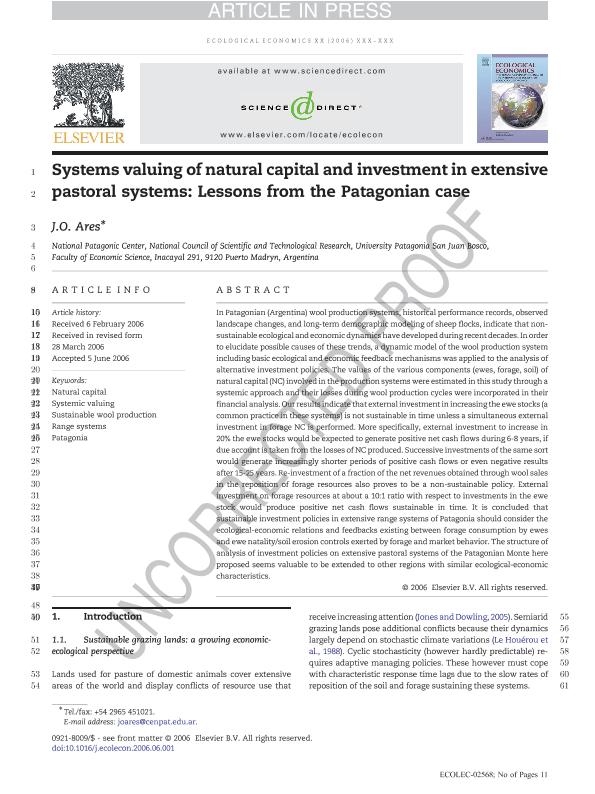Mostrar el registro sencillo del ítem
dc.contributor.author
Ares, Jorge Oscar

dc.date.available
2020-04-20T14:47:18Z
dc.date.issued
2007-04
dc.identifier.citation
Ares, Jorge Oscar; Systems valuing of natural capital and investment in extensive pastoral systems: Lessons from the Patagonian case; Elsevier Science; Ecological Economics; 62; 1; 4-2007; 162-173
dc.identifier.issn
0921-8009
dc.identifier.uri
http://hdl.handle.net/11336/103000
dc.description.abstract
In Patagonian (Argentina) wool production systems, historical performance records, observed landscape changes, and long-term demographic modeling of sheep flocks, indicate that non-sustainable ecological and economic dynamics have developed during recent decades. In order to elucidate possible causes of these trends, a dynamic model of the wool production system including basic ecological and economic feedback mechanisms was applied to the analysis of alternative investment policies. The values of the various components (ewes, forage, soil) of natural capital (NC) involved in the production systems were estimated in this study through a systemic approach and their losses during wool production cycles were incorporated in their financial analysis. Our results indicate that external investment in increasing the ewe stocks (a common practice in these systems) is not sustainable in time unless a simultaneous external investment in forage NC is performed. More specifically, external investment to increase in 20% the ewe stocks would be expected to generate positive net cash flows during 6-8 years, if due account is taken from the losses of NC produced. Successive investments of the same sort would generate increasingly shorter periods of positive cash flows or even negative results after 15-25 years. Re-investment of a fraction of the net revenues obtained through wool sales in the reposition of forage resources also proves to be a non-sustainable policy. External investment on forage resources at about a 10:1 ratio with respect to investments in the ewe stock would produce positive net cash flows sustainable in time. It is concluded that sustainable investment policies in extensive range systems of Patagonia should consider the ecological-economic relations and feedbacks existing between forage consumption by ewes and ewe natality/soil erosion controls exerted by forage and market behavior. The structure of analysis of investment policies on extensive pastoral systems of the Patagonian Monte here proposed seems valuable to be extended to other regions with similar ecological-economic characteristics.
dc.format
application/pdf
dc.language.iso
eng
dc.publisher
Elsevier Science

dc.rights
info:eu-repo/semantics/openAccess
dc.rights.uri
https://creativecommons.org/licenses/by-nc-sa/2.5/ar/
dc.subject
NATURAL CAPITAL
dc.subject
SYSTEMIC VALUING
dc.subject
SUSTAINABLE WOOL PRODUCTION
dc.subject
RANGE SYSTEMS
dc.subject
PATAGONIA
dc.subject.classification
Otras Ciencias Agrícolas

dc.subject.classification
Otras Ciencias Agrícolas

dc.subject.classification
CIENCIAS AGRÍCOLAS

dc.title
Systems valuing of natural capital and investment in extensive pastoral systems: Lessons from the Patagonian case
dc.type
info:eu-repo/semantics/article
dc.type
info:ar-repo/semantics/artículo
dc.type
info:eu-repo/semantics/publishedVersion
dc.date.updated
2020-04-06T16:11:53Z
dc.journal.volume
62
dc.journal.number
1
dc.journal.pagination
162-173
dc.journal.pais
Países Bajos

dc.journal.ciudad
Amsterdam
dc.description.fil
Fil: Ares, Jorge Oscar. Consejo Nacional de Investigaciones Científicas y Técnicas. Centro Nacional Patagónico; Argentina
dc.journal.title
Ecological Economics

dc.relation.alternativeid
info:eu-repo/semantics/altIdentifier/doi/http://dx.doi.org/10.1016/j.ecolecon.2006.06.001
dc.relation.alternativeid
info:eu-repo/semantics/altIdentifier/url/https://www.sciencedirect.com/science/article/abs/pii/S0921800906002990
Archivos asociados
